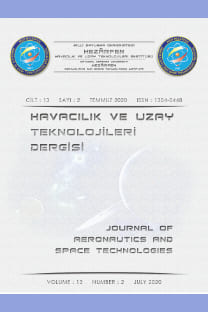Analysis of cooperative behavior for autonomous wide area search munitions
Otonom geniş alan arama mühimmatı için kooperatif davranışın analizi
___
- [1] Dunkel E. Robert III. “Investigation of Cooperative Behavior in Autonomous Wide Area Search Munitions” AFIT Masters Thesis 2002.
- [2] Frelinger, David, Joel Kvitky, and William Stanley. “Proliferated Autonomous Weapons; An Example of Cooperative Behavior.” Technical Report, RAND, 1998.
- [3] Jacques, David R. “Search, Classification, and Attack Decisions for Cooperative Wide Area Search Munitions,” Cooperative Control Models, Applications and Algorithms, Kluwer Academic Publications, Boston, 2003.
- [4] Gillen, Daniel P. “Cooperative Behavior Schemes for Improving the Effectiveness of Autonomous Wide Area Search Munitions,” AFIT Masters Thesis, 2001.
- [5] Gillen, Daniel P. and David R. Jacques “Cooperative Behavior Schemes for Improving the Effectiveness of Autonomous Wide Area Search Munitions.” Workshop on Cooperative Control and Optimization, Gainsville, Florida, November 2001.
- [6] Park, Sang Mork. “Analysis for Cooperative Behavior Effectiveness of Autonomous Wide Area Search Munitions” AFIT Masters Thesis 2002.
- [7] “Low Cost Autonomous Attack System (LOCAAS) Miniature Munition Capability.” Http.://www.fas.org/man/dod- 101/sys/smart/locaas.htm 12/12/2002.
- [8] Jacques, David R. and Robert LeBlanc. “Effectiveness Analysis for Wide Area Search Munitions,” American Institute of Aeronautics and Astronautics, Missile Sciences Conference (1998). Monterey, CA.
- [9] Koopman ,Bernard. “Search and General Screening; General Principal with Historical Applications.” Newyork: Pergamon Press, 1980.
- [10] Washburn, Alan R. Search and Detection, 2nd edition. Operations Research Society of America, 1989.
- [11] Jacques, David R. and Meir N. Pachter “A Theoretical Foundation for Cooperative Search, Classification, and Target Attack.” Workshop on Cooperative Control and Optimization, Gainsville, Florida, December 2002.
- [12] Rasmussen, S. J. and P. R. Chandler. “MultiUAV: A multiple UAV Simulation for Investigation of Cooperative Control” Proceedings of the 2002 Winter Simulation Conference San Diego, CA.
- [13] MultiUAV Simulation Version 1.1 October 2001 AFRL/VACA.
- ISSN: 1304-0448
- Yayın Aralığı: 1
- Başlangıç: 2003
- Yayıncı: Dr. Öğr. Üyesi Fatma Kutlu Gündoğdu
Bir çevik yazılım geliştirme sürecinin uyarlanması ve uygulanması
Kadir ÇAMOĞLU, Derya AKBAYIR, FATİH YÜCALAR, HÜSEYİN FEHMİ SELİM BAYRAKLI
Türkçe metinden konuşma sentezlemede yaşanan sıkıntılar ve çözüm yöntemleri
Ş. Murat CANAL, Sefer KURNAZ, E. Egemen YILMAZ
Gözetleme/saldırı amaçlı mini insansız hava aracı tasarımı ve üretimi
A. Serkan AKGÜL, ABDURRAHMAN HACIOĞLU
The factors affecting non-linear dynamics of a special centrifugal adjuster
İş süreçlerinin modellenmesinde gert şebekelerinin kullanımı
Analysis of cooperative behavior for autonomous wide area search munitions
Dikey iniş-kalkış yapabilen dört rotorlu hava aracının (quadrotor) uçuş kontrolü
İ. Can DİKMEN, Aydemir ARISOY, HAKAN TEMELTAŞ
İnsansız hava araçlarının genetik algoritma yöntemiyle çoklu hedeflere planlanması
Sensör verisi birleştirme teknikleri ve hedef izleme sistemine uygulanması
